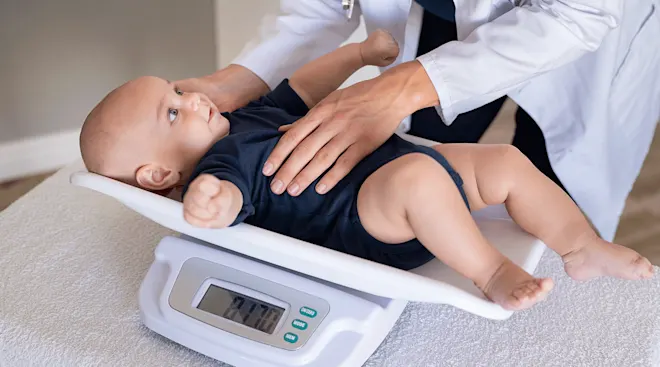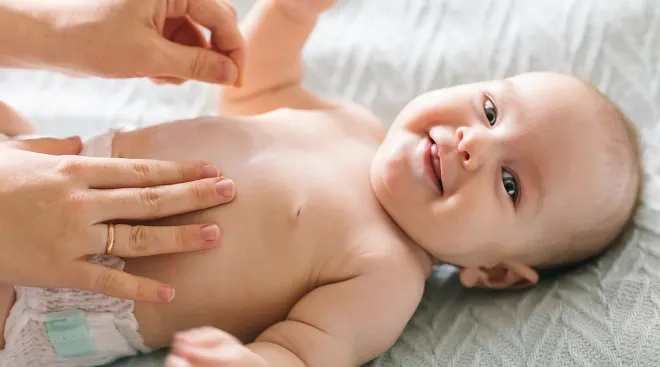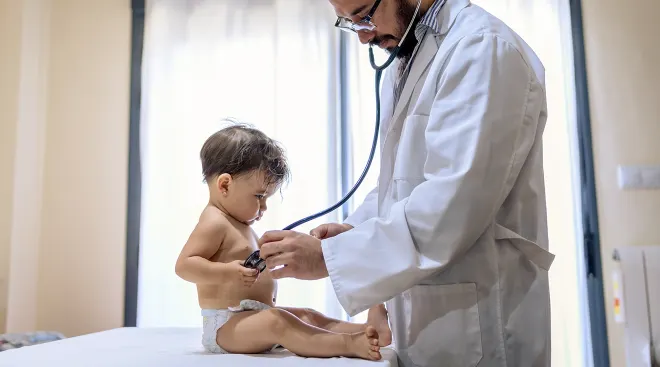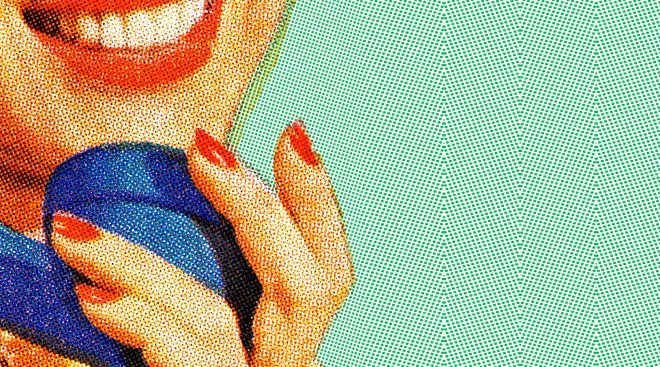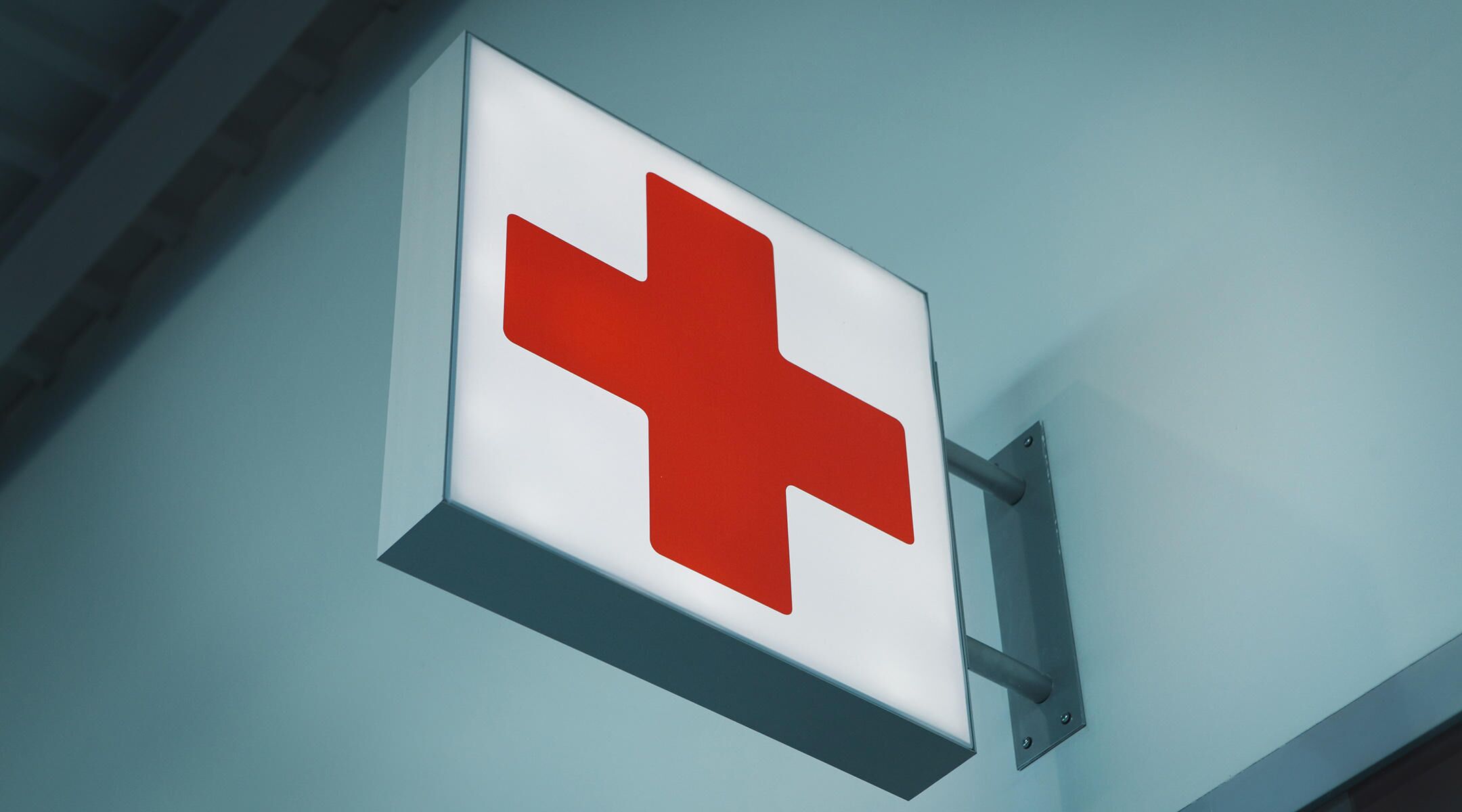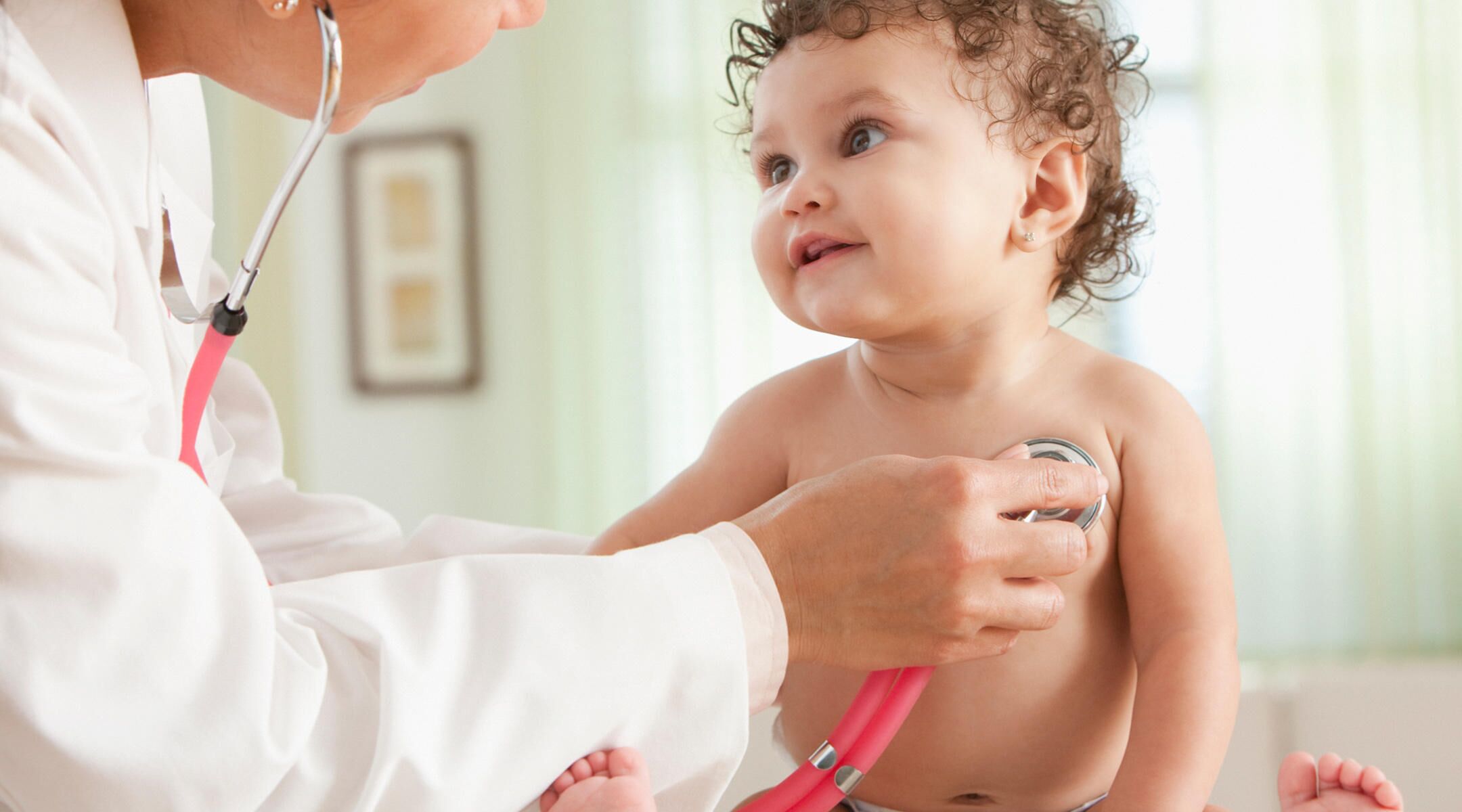What to Expect at Your Toddler's 18 Month Checkup
By 18 months, your tiny tot has probably hit tons of milestones—they may be walking, running and even climbing. They’re likely also still teething, starting to say words, clapping for themselves, and exercising more independence (which may also be causing an uptick in tantrums). To ensure your toddler’s growth and development is on track, your pediatrician will bring them in for an 18 month checkup. Keep reading to learn more about what happens during the appointment and how you can best prepare.
You may have noticed your child becoming a little more fussy or upset at their last checkup, which makes sense, as doctors’ offices can have long wait times. To ensure a smooth appointment this time around, Lauren Crosby, MD, FAAP, a California-based pediatrician, advises parents to bring a favorite toy, some books, a pacifier, milk, water and plenty of snacks.
Of course, another reason baby may become testy during the checkup is a natural dislike for being poked and prodded. To help prepare them for what to expect, try using a children’s book, says Ruben Espinoza, a pediatrician with Banner Medical Group. Crosby also recommends using a toy doctor kit to role play. “They can pretend with their family members, and include favorite stuffed animals getting checkups,” she says. Just don’t assume your child is afraid, as your tone could incite fear that didn’t previously exist. Rest assured, it’s normal for your little one to be upset at checkups, but they’ll eventually grow out of it.
The lineup for the 18 month checkup looks similar to that of the 15 month checkup. It involves a comprehensive physical and verbal assessment of your toddler’s growth and development, as well as follow-up discussions for anything brought up at the previous appointment. According to the American Academy of Pediatrics (AAP), during the 18 month appointment, your pediatrician will do a physical exam to look at some or all of the following (based on individual risk factors and symptoms):
- Growth (by measuring baby’s height, weight and head circumference, all of which will be added to their growth chart)
- Blood pressure
- Ears, ears, nose, mouth and throat
- Hearing and vision
- New and existing teeth that need an application of fluoride varnish (this helps strengthen tooth enamel)
- Genitals (a quick check to ensure they’re healthy and developing properly)
- Potential anemia
- Possible lead exposure
Along with these physical assessments, the 18 month checkup also involves tons of questions and discussion on various aspects of baby’s overall development, including milestones, behavioral development and immunizations (more on this below). Keep reading to learn about some topics your pediatrician will want to discuss.
Milestone assessment at 18 months
According to the AAP, Crosby and Loretta Cody, MD, a Connecticut-based pediatrician, at the 18 month doctor appointment, your pediatrician will ask questions about developmental milestones such as:
- Whether your kiddo can run and climb
- If they can throw an object and stack a tower of three or more blocks
- Other playtime activities your child likes, like scribbling and pretend play
- If your tot attempts to mimic chores like sweeping and dusting
- How well your child plays with other children
- Whether your child can help dress and undress themselves
- Whether they attempt to show you objects by pointing at them
- If they turn to primary caregivers to gauge their reaction when something new happens
- If they try to use and can recognize a few words
- If they can recognize a few different body parts and animal sounds
- Whether your child can understand commands
- If and how they show you and others affection
- Whether they have frequent tantrums and fussiness
- How often they assert their independence
Autism screening at 18 months
As part of the milestone assessment, your pediatrician will also screen for autism at the 18 month checkup through questionnaires. The most commonly used one is the Modified Checklist for Autism in Toddlers-Revised with Follow-Up (MCHAT-R/F). “The questionnaire is filled out by parents, and the results are discussed with your healthcare provider,” Cody says. “Your doctor will also review your previous checkups to make sure your child has been screened appropriately, and add additional screening if it was not completed.” According to the AAP, the questionnaire has 23 points and asks about baby’s speech development, behavior, how they respond to their name, how they laugh, when they cry and more. Your pediatrician may also observe your child for signs of autism, such as not making eye contact or not interacting with a parent. These observations help providers identify risk factors, and surface potential early intervention steps, such as speech and physical therapy. However, the organization emphasizes that the questionnaire, while helpful, is not diagnostic, as autism is also dependent on factors like health, family history and any observations you’ve made as the child’s parent.
Dietary habits and nutrition check in at 18 months
During the toddler stage, your little one may start to develop some picky eating habits. Your pediatrician (and likely you) will want to discuss what types of healthy and nutritious foods your tot consumes. Crosby and Cody note they may ask questions about:
- Bottle weaning and whether your kiddo has started using cups with straws
- How much food and milk they consume per day (through both meals and snacks)
- Whether your child feeds themselves or tries to use utensils
- The variety of fruits and vegetables they eat daily
- How many ounces of water and milk your child drinks per day, and the type of milk they consume (i.e. whole milk, low fat milk, etc.)
- How you handle mealtimes when your child doesn’t want to eat
- Mealtime safety, like whether your child eats in a high chair, while sitting or standing, and whether the food is small enough to prevent choking
Crosby notes that, along with dietary practices, your pediatrician will also want to know about your child’s dental care habits, such as teethbrushing and whether your child has been to the dentist yet. They’ll also ask about bowel movements (how many times your child goes in a day, the consistency of their poops and signs of potty training readiness).
Sleeping habits check in at 18 months
As your little one grows, they’ll start to need a little less sleep and may even be ready to drop their second nap. Crosby and Cody note your provider will inquire about your child’s:
- Bedtime and naptime routines
- Sleep habits, including how much sleep they get every night and during naps
- How often they wake up and whether they can self-soothe
- Behavior and mood around daily nap times (i.e. crankiness or fussiness)
Child safety check in at 18 months
During the well-visit, your provider will likely also discuss certain aspects of child safety inside and outside of the home, now that your tiny tot is more mobile. According to Cody and Espinoza, this includes things like:
- Car seat safety
- Water safety
- Babyproofing (ensuring that furniture is anchored, stairs have baby gates, hot liquids are always out of reach, etc.)
Which vaccines your child will get at their 18 month appointment depends on the schedule you and your doctor have chosen, Crosby says, as vaccines can typically be administered between different age ranges. They may only need one or two shots at this visit (depending on whether there are any previously missed vaccinations). These might include:
- Hepatitis A
- DTaP (diphtheria, tetanus and pertussis)
- Influenza vaccine (if it’s flu season)
Bring any previous immunization and testing records to your child’s 18 month checkup appointment, as well as a list of any questions or concerns you may have about your child’s development. Cody recommends writing all these down so you don’t forget them during the appointment. You might consider inquiring about the following topics:
- Potty training and how to tell when your child is ready
- How to handle tantrums and calm your child when they’re upset
- How to deal with any separation anxiety and clinginess
- How to discipline toddlers, such as with time-outs and time-ins
- How to manage picky eating habits, and whether your child needs to take vitamins
- Screen time recommendations
- Playtime ideas to encourage learning and development
- How to encourage speech development (i.e. through conversation, reading, etc.)
- When to switch your child from a rear- to front-facing car seat
- When and how to use sunscreen
- When it’s okay to drop the second nap
Ultimately, it’s best to bring up any and all questions or concerns you have about your child—even if they seem small or silly. Moreover, Cody says that there are some behaviors that should be flagged with your pediatrician, as they can indicate developmental delays and issues. If your child isn’t attempting to mimic others’ actions, or if they’re not yet walking, pointing and/or learning new words, you should mention this to your doctor. Additionally, if your toddler is losing any previously learned skills, you’ll want to address this as well.
At 18 months, your child is learning and growing. They may oscillate between clinginess and wanting to be independent. Rest assured that this is normal—after all, they’re still figuring out how the world works and how they fit into it. Espinoza emphasizes that children look towards primary caregivers for the security and confidence they need to explore. When your tot is being difficult, show them (and yourself) some grace and patience, he adds. Enjoy this age while it lasts—before you know it, you’ll be taking your tot to their next pediatrician appointment, which will occur in 6 months, when your kiddo turns 2.
Please note: The Bump and the materials and information it contains are not intended to, and do not constitute, medical or other health advice or diagnosis and should not be used as such. You should always consult with a qualified physician or health professional about your specific circumstances.
Plus, more from The Bump:
Loretta Cody, MD, is a board-certified pediatrician based out of Connecticut. She received her medical degree from New York Medical College and completed her residency at Yale New Haven Children’s Hospital.
Lauren Crosby, MD, FAAP, is a pediatrician with La Peer Pediatrics in Beverly Hills, California, as well as a mom of two. She earned her medical degree from UCLA School of Medicine and completed her residency at Cedars-Sinai Medical Center. She currently serves as an official spokesperson for the American Academy of Pediatrics.
Ruben Espinoza, MD, is a pediatrician and the division medical director for primary care at Banner Medical Group’s east region in Arizona. He completed his medical degree at Universidad Autonoma De Baja California and his residency at Elmhurst Hospital Center-Mt Sinai Services in New York City.
Healthy Children (American Academy of Pediatrics), Your Checkup Checklist: 18 Months Old, July 2022
Healthy Children (American Academy of Pediatrics), How Pediatricians Screen for Autism, December 2019
Learn how we ensure the accuracy of our content through our editorial and medical review process.
Navigate forward to interact with the calendar and select a date. Press the question mark key to get the keyboard shortcuts for changing dates.
Advertisement
Advertisement
Advertisement
Advertisement



































